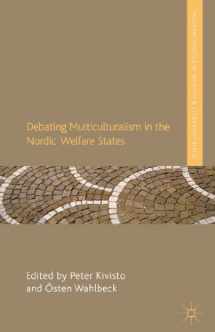
Debating Multiculturalism in the Nordic Welfare States (Palgrave Politics of Identity and Citizenship Series)
ISBN-13:
9780230360198
ISBN-10:
023036019X
Edition:
2013
Author:
P. Kivisto, Ö. Wahlbeck
Publication date:
2013
Publisher:
Palgrave Macmillan
Format:
Hardcover
373 pages
Category:
Emigration & Immigration
,
Social Sciences
FREE US shipping
Book details
ISBN-13:
9780230360198
ISBN-10:
023036019X
Edition:
2013
Author:
P. Kivisto, Ö. Wahlbeck
Publication date:
2013
Publisher:
Palgrave Macmillan
Format:
Hardcover
373 pages
Category:
Emigration & Immigration
,
Social Sciences
Summary
Debating Multiculturalism in the Nordic Welfare States (Palgrave Politics of Identity and Citizenship Series) (ISBN-13: 9780230360198 and ISBN-10: 023036019X), written by authors
P. Kivisto, Ö. Wahlbeck, was published by Palgrave Macmillan in 2013.
With an overall rating of 4.4 stars, it's a notable title among other
Emigration & Immigration
(Social Sciences) books. You can easily purchase or rent Debating Multiculturalism in the Nordic Welfare States (Palgrave Politics of Identity and Citizenship Series) (Hardcover) from BooksRun,
along with many other new and used
Emigration & Immigration
books
and textbooks.
And, if you're looking to sell your copy, our current buyback offer is $0.3.
Description
Like many other Western democracies, the Nordic countries have vigorously debated whether it is necessary to find new ways of incorporating ethnic minorities into the larger society, leading to the need to decide whether to enter into experiments in multiculturalism or to resist such a prospect. This edited collection addresses the varied ways that four countries have addressed the issue of the inclusion of ethnic minorities - including both old minorities and recent immigrants. Because of their robust social democratic welfare policies, these nations constitute an important research site for exploring the ways in which the politics of identity and recognition play out in societies committed to redistributive politics. Put simply, can the goals of the welfare state and those of multiculturalism coexist in harmony? Are they capable of being mutually reinforcing? Or will they inevitably be at loggerheads, operating in what amounts to a zero-sum game: redistribution at the expense of recognition and vice versa?


We would LOVE it if you could help us and other readers by reviewing the book
Book review

Congratulations! We have received your book review.
{user}
{createdAt}
by {truncated_author}


